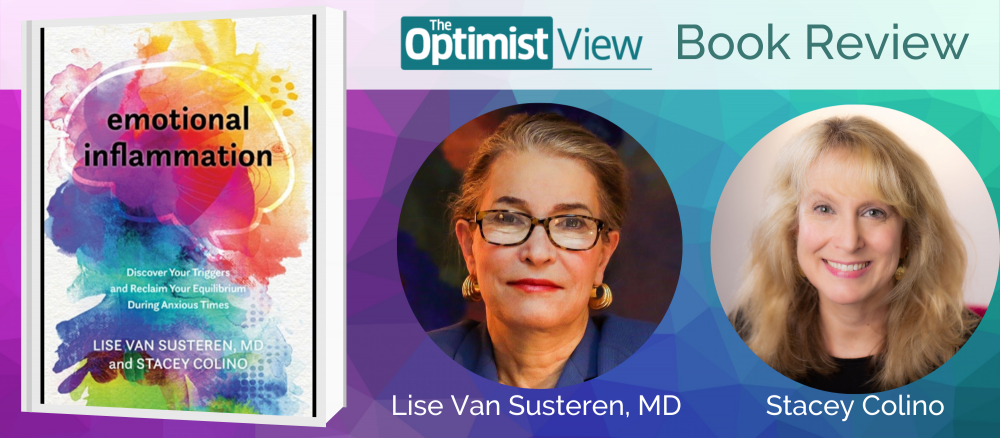BOOK REVIEW of Emotional Inflammation: Discover Your Triggers and Reclaim Your Equilibrium during Anxious Times by Lise Van Susteren, MD and Stacey Colino
By Kristy Jansen
Inflammation (n): a localized physical condition in which part of the body becomes reddened, swollen, hot, and often painful, especially as a reaction to injury or infection.
Over the last few weeks, images of orange skies and ashy streets have dominated the front pages of most major news outlets, alongside headlines including words like “apocalypse,” “catastrophe,” and “raging out of control.” Meanwhile, the Covid-19 pandemic continues unabated; fall semester has begun in turmoil with school districts and college campuses choosing between two terrible options: distance learning over video calls or in-person classes and virus outbreaks. The economy is reeling, the political rhetoric is nasty, and social gatherings are fraught with danger. Is it any wonder that Americans are “quaran-drinking,” taking xanax, and reporting unprecedented levels of dread and and depression?
In their fantastic book, Emotional Inflammation: Discover Your Triggers and Reclaim Your Equilibrium During Anxious Times, Lise Van Susteren, MD and Stacey Colino take a wide-ranging look at the ever-increasing emotional high alert plaguing our collective and individual consciousness. It’s been creeping up on us for years, but in these last six months the turmoil seems to have gone into stratospheric overdrive. Released in April of this year, just as most of the world entered coronavirus lock-down, this book seems clairvoyant. Never has a self-help book so uncannily responded to our moment of need.
The first sentences of the first page set the tone by asking a series of thoughtful questions:
“Hit the pause button on your regularly scheduled life for a moment, and ask yourself: Am I spending a substantial part of my time feeling unusually stressed out and on edge or anxious about the future?”
Yes, I am, I think to myself.
“Do I feel like I’m being bombarded with bad or alarming news or other people’s mercurial moods?”
Absolutely. Every time I open my news feed (check social media, glimpse the tv, talk to certain friends, etc.).
“Am I experiencing emotional whiplash as my feelings swing from sadness to fear to anger or hopelessness in the span of minutes or hours when I hear about the latest natural disaster, human rights crisis, or political debate?”
Ding, ding, ding.
Wow, Lise and Stacey, have you been reading my journal?
As readers of the Optimist Daily know, chronic inflammation has become a medical boogie-man in recent years, implicated in the proliferation of dementia, heart disease, cancer, type 2 diabetes, and a host of other chronic conditions closely linked to Western lifestyles. While fevers and swelling are our body’s natural reaction to infection and injury, designed to cook the invading microbes or flush a bruised limb with healing blood, these inflammatory symptoms are emergency first responders, not designed to stick around indefinitely. If they move in or overreact, that’s when things go off the rails.
The insight of this book is to use physical inflammation as a metaphor for the malaise that so many of us are feeling, and give it a name imbued with the symbolic logic of a fever of the mind, an edema of the spirit. They say the first step to solving a problem is recognizing that you have one. I, for one, certainly do, and it’s called emotional inflammation.
The book is laid out in two parts. The first identifies the varieties and characteristics of emotional inflammation, the second lays out a plan for treating it called RESTORE. One of the more engaging segments details four different types of reactivity to emotional triggers – nervous, revved-up, molten, or retreating – and provides a quiz to help the reader determine where they and others in their lives fall on the reactivity spectrum. Knowing your own reactor style is great for self awareness, but the understanding that not everyone deals with stress in the same way helps foster compassion and communication in our relationships with different reactor types.
Written in an accessible, lively tone with informative asides and solid sources included in the select bibliography, Emotional Inflammation is an approachable, useful guide that also has some scientific heft to it. It reads like a personal message from your smartest friend, if she were also a trained clinical and forensic psychiatrist who’s also one of the most recognized experts in the growing sub-field of mental health and the environment.
While most of the concepts and exercises will be familiar to anyone who’s dabbled in self-care literature, the RESTORE plan is organized very logically, and each suggestion is put into context within the psychological literature. I’m a skeptical reader of popular psychology and eschew feel-good self-help gurus. I therefore find it refreshing to have a smart, well-argued, deeply documented take on why modern day life can feel so overwhelming, and that also offers practical ideas on how to manage my own reactions and stay involved in issues that matter to me without losing my center.
I learned about the upcoming book back in January 2020, when my team and I were on the hunt for experts to feature in a webinar on how to deal with climate anxiety. Dr. Van Susteren, who has authored authoritative articles on the psychological impacts of climate change, and organized one of the first large conferences on this subject in 2009, was my first call. Like the approachable voice that she and Colino have mastered in Emotional Inflammation, Dr. Van Susteren responded warmly and quickly.
I asked her how she came up with the concept of emotional inflammation and why, with her professional focus lately on the intersection of mental health and the environment, she had broadened the subject in this book. She answered that while the climate crisis certainly informed the thinking on this book, she didn’t want to limit the audience by using “climate” in the title.
By focusing on the human experience of becoming inflamed, she hopes to reach anyone whose emotional triggers are raw, no matter where they get the bulk of their news. I found this answer thoughtful, generous, and compassionate, and absolutely characteristic of Lise.
Another character trait that I’ve since had the luck to observe: Dr. Van Susteren is devoid of ego. She graciously agreed to participate in the webinar series, but suggested we also include her co-author, Stacey Colino, a recognized writer, specializing in health and psychology topics. Stacey’s work has consistently offered clear eyed insights on parenting, personal health, fitness and well-being, and she’s been a passionate activist in creating healthy bodies, minds and families for decades. Emotional Inflammation grew out of Lise and Stacey’s conversations about how to talk to children and teenagers who have become preoccupied with heavy topics like gun violence and the climate crisis. Together they realized they had something valuable to contribute to the world, and set about becoming writing partners.
Both Lise and Stacey will participate in the second free webinar in our series on October 9th. Their working sisterhood is clearly evident in every word of their book, and stands out clearly when talking with the two of them together. Summers and I are also excited to share their positive energy and expertise with our podcast audience on The Optimist Daily Update next week.
As the Chief of Content on the Optimist Daily, it’s my job to help our readers stay connected to the news and events in the world without succumbing to the hysteria of the moment. We seek the solutions behind the breaking news, get behind the front page and lift up the out-of-the-box thinkers, inspired doers, and brilliant fixes that provoke positive emotional contagion. But being a “media therapist” does take a heavy toll; for all those golden nuggets of awesomeness, we must sift through a massive pile of…mud. I feel grateful to have encountered these two brilliant allies in our quest to shift the focus back to what’s possible and reconnect to our collective sense of joy.
Emotional Inflammation: Discover Your Triggers and Reclaim Your Equilibrium during Anxious Times
by Lise Van Susteren, MD and Stacey Colino
(283 pp. Sounds True. $24.99)
_____________
About the Author:
 Kristy Jansen is Chief Content Officer at the Optimist Daily, produces a weekly radio show, Solutions News and serves as Chief of Staff at TOD’s publishing partner, the World Business Academy, a nonprofit think tank and action incubator working to shift the consciousness of business. Her passions include conscious mass media, socially responsible entrepreneurialism, intentional communities, nonviolent civil resistance, regenerative economies, smart science fiction and, of course, the positive power of rational optimism.
Kristy Jansen is Chief Content Officer at the Optimist Daily, produces a weekly radio show, Solutions News and serves as Chief of Staff at TOD’s publishing partner, the World Business Academy, a nonprofit think tank and action incubator working to shift the consciousness of business. Her passions include conscious mass media, socially responsible entrepreneurialism, intentional communities, nonviolent civil resistance, regenerative economies, smart science fiction and, of course, the positive power of rational optimism.











